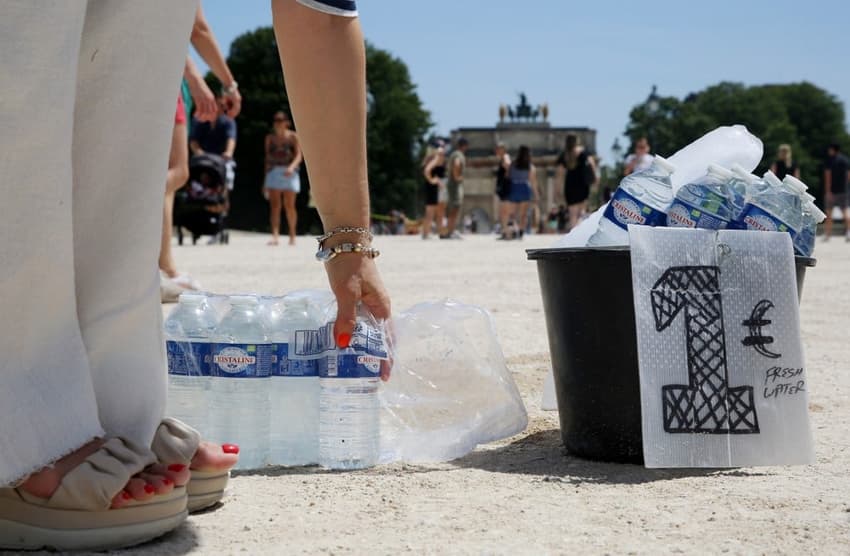Record breaking Parisian summer exposes lack of trees in capital

Paris ranks poorly compared with other major cities when it comes to 'green cover' provided by trees, and record-breaking heatwaves are bringing this to light.
According to figures from the World Cities Culture Forum, just 10 percent of Paris is considered green space.
That number pales in comparison with other major capitals, and is nowhere near cities such as London, on 33 percent, or Oslo, where a staggering 68 percent of the city is made up of green space like parks and gardens.
While this may be old news for many Parisians, this summer's record breaking heatwaves are really bringing the point home. The asphalt outside Paris' Garnier Opera house, for example, recently reached 56C, and Parisians have little shade or green space in which to avoid the heat.
And the scorching temperatures have affected the whole of France. At the peak of the June heatwave, a village in southern France in June recorded the country's first ever 46 degree temperature, and cities across the country are braced for further scorching temperatures, with 26 départements currently placed on heatwave alert at the ‘orange’ level.
READ ALSO: Heat alerts: What temperatures can we expect in France this week?
According to France's national weather agency, Meteo France, last month was the hottest July on record, and for those who were in capital, the sweltering temperatures laid bare not only Paris's lack of shade but its need for natural defences against global warming.
With little shade and green space to shelter in, Parisians are feeling the full brunt of the heat.
Paris City Hall has outlined plans to plant 170,000 trees by 2026 and fill the city with "islands of freshness", however the green plans have provoked some protests and opposition. Environmental campaigners say local authorities have felled decades-old trees to clear the way for garden spaces.
In the longer term, however, cutting down older trees contradicts the authorities' own ambitions as saplings are weaker in the face of drought and less useful in fighting temperature radiation, according to activists.
Urban planners claim that Paris cannot confront record temperatures and climate change more broadly without cutting down some trees.
Comments (1)
See Also
According to figures from the World Cities Culture Forum, just 10 percent of Paris is considered green space.
That number pales in comparison with other major capitals, and is nowhere near cities such as London, on 33 percent, or Oslo, where a staggering 68 percent of the city is made up of green space like parks and gardens.
While this may be old news for many Parisians, this summer's record breaking heatwaves are really bringing the point home. The asphalt outside Paris' Garnier Opera house, for example, recently reached 56C, and Parisians have little shade or green space in which to avoid the heat.
And the scorching temperatures have affected the whole of France. At the peak of the June heatwave, a village in southern France in June recorded the country's first ever 46 degree temperature, and cities across the country are braced for further scorching temperatures, with 26 départements currently placed on heatwave alert at the ‘orange’ level.
READ ALSO: Heat alerts: What temperatures can we expect in France this week?
According to France's national weather agency, Meteo France, last month was the hottest July on record, and for those who were in capital, the sweltering temperatures laid bare not only Paris's lack of shade but its need for natural defences against global warming.
With little shade and green space to shelter in, Parisians are feeling the full brunt of the heat.
Paris City Hall has outlined plans to plant 170,000 trees by 2026 and fill the city with "islands of freshness", however the green plans have provoked some protests and opposition. Environmental campaigners say local authorities have felled decades-old trees to clear the way for garden spaces.
In the longer term, however, cutting down older trees contradicts the authorities' own ambitions as saplings are weaker in the face of drought and less useful in fighting temperature radiation, according to activists.
Urban planners claim that Paris cannot confront record temperatures and climate change more broadly without cutting down some trees.
Join the conversation in our comments section below. Share your own views and experience and if you have a question or suggestion for our journalists then email us at [email protected].
Please keep comments civil, constructive and on topic – and make sure to read our terms of use before getting involved.
Please log in here to leave a comment.